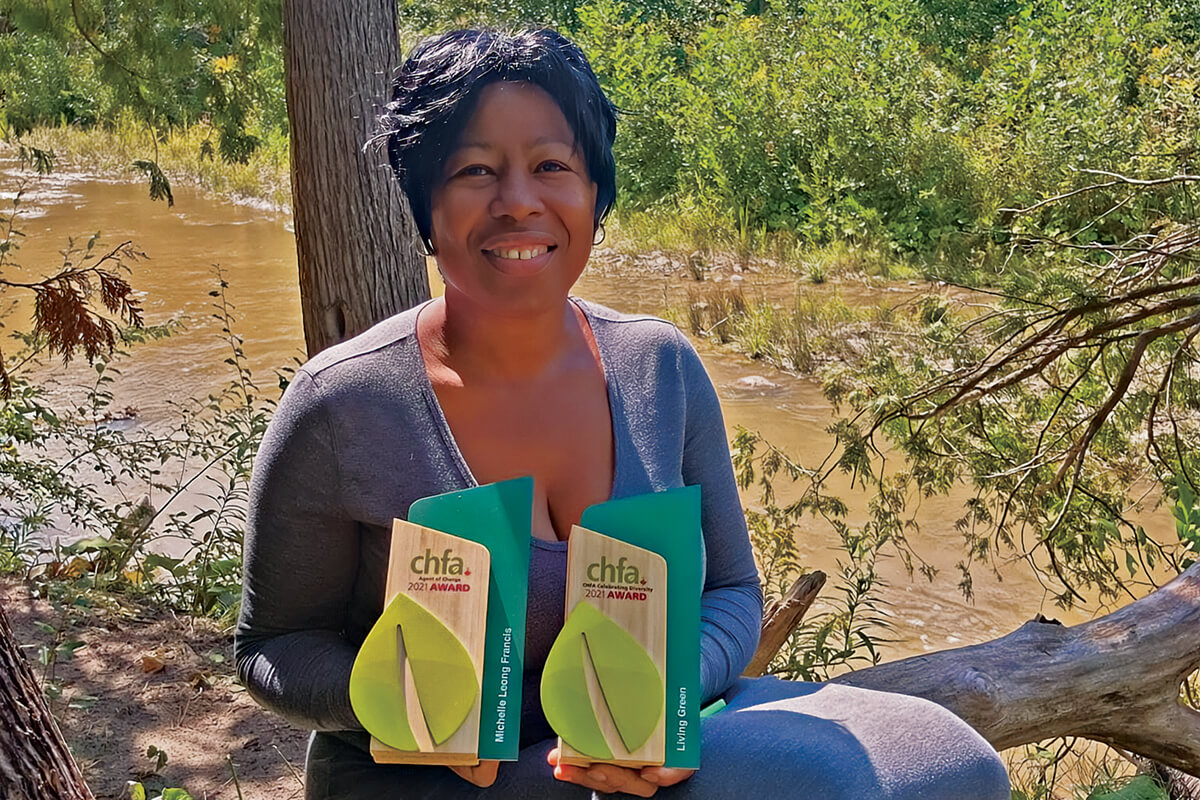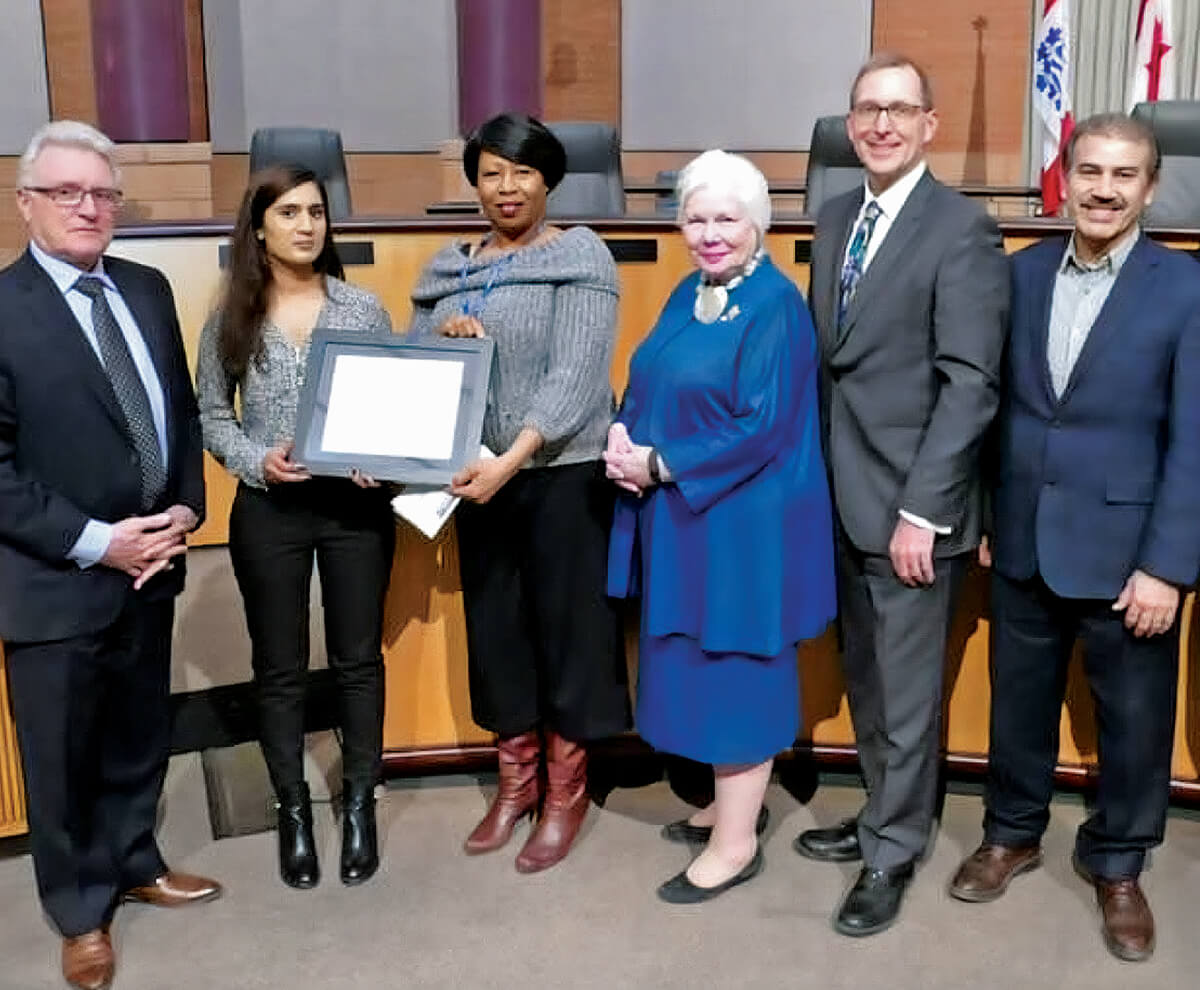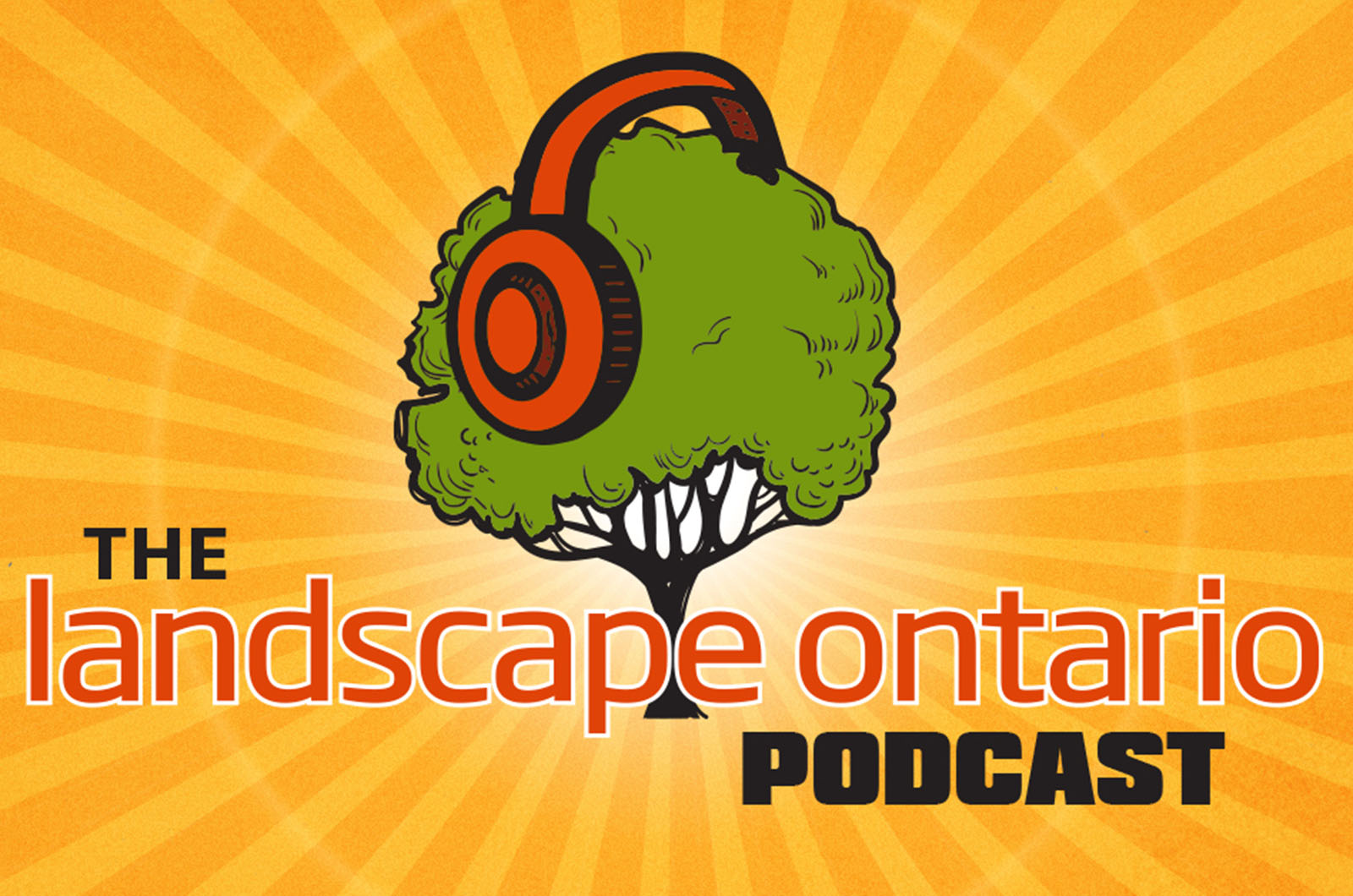January 17, 2025

Michelle Francis
Accident on purpose: When fate makes you a force to be reckoned with
Interview with Michelle Francis
This interview originally aired on the Landscape Ontario podcast and has been edited for length and clarity.
One rainy fall afternoon, Michelle Francis’ life changed in the blink of an eye, forcing her to reevaluate her priorities. Francis has led a busy life as a CEO, HR law professional, social justice champion and mother, to name just a few. She is a nature enthusiast with extensive outdoor education training, and is also a graduate of Landscape Ontario’s GROW program. Through her connection with nature, she’s found healing and purpose — something she’s eager to share with others. Francis now educates people about the value of community gardens, and mentors youth to help build, install and maintain them for clients. In the colder months, Francis returns her attention to HR law consulting and advocacy efforts.
Francis joined the Landscape Ontario Podcast to share her story about embracing life’s challenges with an open heart. She acknowledges that accidents have purpose, and the healing she experienced while spending time in gardens and nature compelled her to create opportunities for others to discover the transformative power of plants.

I had major issues at the top and bottom of my spine. There was no relief. And that started the journey of me reconciling with a whole lot of things. As someone who’s naturally active, not being able to do much was frustrating. But one thing I remember distinctly was the daily ritual in the garden.
It became me versus my lack of mobility. Gardening gave me a sense of control. That year, I grew a really large garden, trying every seed I could get my hands on. It was about seeing potential — in the plants and in myself as I recovered.
With my mobility impacted, I had to be mindful of where I went, how far I walked and what I wore. But in the garden, there were no restrictions. I could start and stop as I needed. If I struggled to get up from the ground, no one was there to witness my strategic moves to get back on my feet.
I delved deeply into how being in nature — watching bees, slowing down — can be therapeutic. Slowing down isn’t something you do in the corporate world. There’s no such beast. I use the phrase, “the accident on purpose,” because the purpose was to reconnect me with myself and teach me to slow down.
I’m a Virgo and a Type A personality. But at that point in my life, I was forced to move in slow motion and realize what’s really important in my life.
So yes, I think I was given an opportunity to hone some intuitive and speculative knowledge into something very viable. I could be seen as a trusted source when guiding people on what products they could grow and in what environment — even in small spaces. I’ve learned so many insightful tips and tools that, had I not gone through this experience, I would never have been aware of, to this degree.
Now, soil and nature and having my hands on the ground — it’s the building blocks for everyone’s life. People maybe just don’t know it. I would hate for people to have accidents to realize how important their outdoor space is to them, whether it’s theirs or the community’s.
In that regard, I’ve reconnected with growing a community garden and really enhanced my ability to grow food. I was recognized by my local city, the City of Pickering, which is quite well-known for its international sustainability status — now in its 12th year. I received an award for sustainability. I also received an award for energy efficiency because of the way I grow using a permaculture approach. I produce very little garbage that goes back into the community and landfills.
Additionally, I received two awards from the Canadian Health Food Association during COVID: one for being a change agent and another for cultural diversity because I grow foods from around the world. At the start of COVID, I received a very prestigious award as one of the top 100 Black women entrepreneurs in Canada.
From personal experience, I’ve seen that even something as small as having a plant in a hospital room can make a difference. Patients will water it, try to get out of bed and see their situation is not their finite future because now they’re seeing a plant bloom and grow. During COVID, my mother broke her leg twice and developed PTSD about falling. We placed a plant in her room to motivate her to get out of bed. It worked — it became a key part of her recovery, reminding her that life ebbs and flows.
Plants aren’t just beautiful or something we control — they’re a source of motivation, a reminder of cycles and resilience. They bring deep meaning to life.
They are, in a way, a “gateway drug” to balance and the natural rhythm of what we were meant to be as humans. I was once the typical person lost in the corporate grind — everything planned out, with my leather attaché case and daytimer and iPhone. I did everything and yet still was in a nonsensical accident.
The preordainedness of this experience — the universe couldn’t have given this opportunity to a better person.
I’ve become a lobbyist — an extension of my corporate side but today’s world almost demands that if you want to have impactful conversations at the municipal level. So I can ask: If we’re building affordable housing, are we also creating community gardens? Are our health care improvements including labyrinths and green spaces? Are we educating people about these benefits?
I’m now undeniable in my advocacy and my proof of concept. This works and it makes a difference. I’m stronger and very different from the person I was before the accident. The corporate world does not allow this part of you to show much. But between the accident and COVID, I have become a force to be reckoned with.
This interview originally aired on the Landscape Ontario podcast and has been edited for length and clarity.
One rainy fall afternoon, Michelle Francis’ life changed in the blink of an eye, forcing her to reevaluate her priorities. Francis has led a busy life as a CEO, HR law professional, social justice champion and mother, to name just a few. She is a nature enthusiast with extensive outdoor education training, and is also a graduate of Landscape Ontario’s GROW program. Through her connection with nature, she’s found healing and purpose — something she’s eager to share with others. Francis now educates people about the value of community gardens, and mentors youth to help build, install and maintain them for clients. In the colder months, Francis returns her attention to HR law consulting and advocacy efforts.
Francis joined the Landscape Ontario Podcast to share her story about embracing life’s challenges with an open heart. She acknowledges that accidents have purpose, and the healing she experienced while spending time in gardens and nature compelled her to create opportunities for others to discover the transformative power of plants.

After decades of building a fast-paced corporate career, what brought you back to nature?
A pivotal moment was a very eye-opening motor vehicle accident. I was sitting in a vehicle in traffic. I heard screeching from somewhere, and I looked up in the rearview mirror to see someone barreling at my vehicle.I had major issues at the top and bottom of my spine. There was no relief. And that started the journey of me reconciling with a whole lot of things. As someone who’s naturally active, not being able to do much was frustrating. But one thing I remember distinctly was the daily ritual in the garden.
It became me versus my lack of mobility. Gardening gave me a sense of control. That year, I grew a really large garden, trying every seed I could get my hands on. It was about seeing potential — in the plants and in myself as I recovered.
With my mobility impacted, I had to be mindful of where I went, how far I walked and what I wore. But in the garden, there were no restrictions. I could start and stop as I needed. If I struggled to get up from the ground, no one was there to witness my strategic moves to get back on my feet.
I delved deeply into how being in nature — watching bees, slowing down — can be therapeutic. Slowing down isn’t something you do in the corporate world. There’s no such beast. I use the phrase, “the accident on purpose,” because the purpose was to reconnect me with myself and teach me to slow down.
I’m a Virgo and a Type A personality. But at that point in my life, I was forced to move in slow motion and realize what’s really important in my life.
Do you feel like the universe had a reason for this?
At that moment, it felt like the universe was punishing me. But I do believe as I was moving through the process, it was on purpose. And one purpose was for me to learn about advocacy. We’re speaking about plants and nature, and at this moment, everyone’s on board. Many people would say, “Right on, I’m right there.” But my accident was in 2010 and, back then, growing things, landscaping, soil quality, herbs and anti-inflammatory foods were not on the radar.So yes, I think I was given an opportunity to hone some intuitive and speculative knowledge into something very viable. I could be seen as a trusted source when guiding people on what products they could grow and in what environment — even in small spaces. I’ve learned so many insightful tips and tools that, had I not gone through this experience, I would never have been aware of, to this degree.
Now, soil and nature and having my hands on the ground — it’s the building blocks for everyone’s life. People maybe just don’t know it. I would hate for people to have accidents to realize how important their outdoor space is to them, whether it’s theirs or the community’s.
Your broadened gardening knowledge gained during this experience has earned you some accolades. Tell me about some of the awards you’ve received thanks to your efforts to reconnect others to gardening
When my children were small, maybe a little socially awkward like myself, one of my ways of helping them was to consistently order soil and seeds and have the kids in the community grow plants. That’s how most of the people on my cul-de-sac started eating salads — because they were growing their own.In that regard, I’ve reconnected with growing a community garden and really enhanced my ability to grow food. I was recognized by my local city, the City of Pickering, which is quite well-known for its international sustainability status — now in its 12th year. I received an award for sustainability. I also received an award for energy efficiency because of the way I grow using a permaculture approach. I produce very little garbage that goes back into the community and landfills.
Additionally, I received two awards from the Canadian Health Food Association during COVID: one for being a change agent and another for cultural diversity because I grow foods from around the world. At the start of COVID, I received a very prestigious award as one of the top 100 Black women entrepreneurs in Canada.
I love the idea that, in your 50s, your story is not done. You’re still growing — in every sense of the word. Now that you’ve accomplished all this, what’s next?
I sit on two hospital boards: the Ontario Health Teams for Durham Region and Scarborough, Toronto. One of my key focuses is ensuring that new health facilities incorporate community gardens and labyrinths in their renovations and constructions. I've been extremely vocal, sometimes showing up at meetings where people don’t expect me, to stress the importance of both.From personal experience, I’ve seen that even something as small as having a plant in a hospital room can make a difference. Patients will water it, try to get out of bed and see their situation is not their finite future because now they’re seeing a plant bloom and grow. During COVID, my mother broke her leg twice and developed PTSD about falling. We placed a plant in her room to motivate her to get out of bed. It worked — it became a key part of her recovery, reminding her that life ebbs and flows.
Plants aren’t just beautiful or something we control — they’re a source of motivation, a reminder of cycles and resilience. They bring deep meaning to life.
They are, in a way, a “gateway drug” to balance and the natural rhythm of what we were meant to be as humans. I was once the typical person lost in the corporate grind — everything planned out, with my leather attaché case and daytimer and iPhone. I did everything and yet still was in a nonsensical accident.
The preordainedness of this experience — the universe couldn’t have given this opportunity to a better person.
I’ve become a lobbyist — an extension of my corporate side but today’s world almost demands that if you want to have impactful conversations at the municipal level. So I can ask: If we’re building affordable housing, are we also creating community gardens? Are our health care improvements including labyrinths and green spaces? Are we educating people about these benefits?
I’m now undeniable in my advocacy and my proof of concept. This works and it makes a difference. I’m stronger and very different from the person I was before the accident. The corporate world does not allow this part of you to show much. But between the accident and COVID, I have become a force to be reckoned with.
